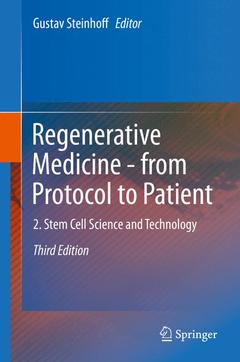Description
Regenerative Medicine - from Protocol to Patient (3rd Ed., Softcover reprint of the original 3rd ed. 2016)
2. Stem Cell Science and Technology
Coordinator: Steinhoff Gustav
Language: English
Subject for Regenerative Medicine - from Protocol to Patient:
Publication date: 05-2016
Support: Print on demand
Publication date: 04-2018
Support: Print on demand
Description
/li>Contents
/li>Biography
/li>Comment
/li>
Regenerative medicine is the main field of groundbreaking medical development and therapy using knowledge from developmental and stem cell biology, as well as advanced molecular and cellular techniques. This collection of volumes on Regenerative Medicine: From Protocol to Patient, aims to explain the scientific knowledge and emerging technology as well as the clinical application in different organ systems and diseases. International leading experts from all over the world describe the latest scientific and clinical knowledge of the field of regenerative medicine. The process of translating science of laboratory protocols into therapies is explained in sections on regulatory, ethical and industrial issues. This collection is organized into five volumes: (1) Biology of Tissue Regeneration, (2) Stem Cell Science and Technology, (3) Tissue Engineering, Biomaterials and Nanotechnology, (4) Regenerative Therapies I, and (5) Regenerative Therapies II. The textbook gives the student, the researcher, the health care professional, the physician and the patient a complete survey on the current scientific basis, therapeutical protocols, clinical translation and practiced therapies in regenerative medicine.
Volume 2 contains sixteen chapters addressing advanced knowledge on ?Stem Cell Science and Technology? addressing basic classification technology, cell biology of stemness state and regulatory molecular pathways. Mechanisms and technology of cell programming are explained, as well as the pathology of cancer cells and dedifferentiation signalling. Pluripotent, multipotent germline and tissue specific human stem cells are classified and qualified according to their respective biological function or tissue regeneration. Leading stem cell scientists from all over the world explain advanced technology, latest knowledge, and clinical implications of human stem cell science in a unique, comprehensive and detailed outline.
Basic molecular mechanisms of human stem cell differentiation
Molecular mechanisms and technologies for (re-)programming
Analytical methods to classify stem cell fate and function
Specific features of different human stem cell types
Physiology and pathology of stem cells
Includes supplementary material: sn.pub/extras




